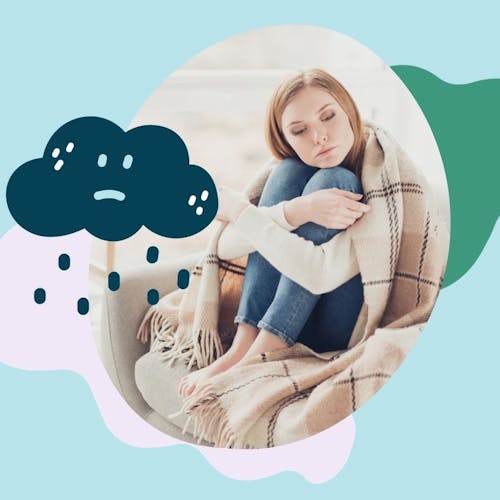This website uses cookies to enhance the user experience. By using Yoppie you are agreeing to our use of cookies.
5 PMS & Mood Swing Myths We Need To Dispel
Written by Yoppie
22 Feb 2021
What is PMS, really?
Myth #1: Everyone with PMS gets the same fun symptoms
Myth #2: Your partner should steer clear of you
Myth #3: Every thought and feeling you have can be blamed on PMS
Myth #4: You will crave chocolate
Myth #5: You can’t do anything about it
Many a TV show has portrayed the premenstrual woman as a weepy, emotional mess who won’t listen to reason. *cue canned laughter* Sometimes this is spot on, but mostly, it doesn’t quite hit the mark when it comes to each person’s individual experience of PMS.
In much the same way as society has spread tall tales of menstruation throughout history (menstruating women attract bears, kill crops and turn wine sour, don’t ya know...), even today we still make sweeping statements about the effects of PMS. Let’s tackle some myths:
What is PMS, really?
PMS stands for premenstrual syndrome, and it typically presents itself as a fun collection of physical and emotional symptoms in the lead up to a period. These symptoms are caused by rising levels of the hormones oestrogen and progesterone, and this tends to happen around the same time each month for most. In fact, PMS is thought to affect over 90% of us in one way or another - blimey! So why don’t we fully understand it yet?
"I am either pms'ing or on my period. nothing else. That is my cycle." - Chrissy Teigen
Myth #1: Everyone with PMS gets the same fun symptoms
If you’re lucky, PMS can look like general irritability and the occasional chuckle-worthy mood swing. If not, you may experience anything from severe anxiety to intense emotional outbursts. A picture of PMS has been painted in pop culture to make it seem like all we need is a hot water bottle and a hug, but in reality, PMS symptoms can be pretty dark for some people.
Mood aside, there’s also a range of physical symptoms to consider, which differ for everyone and can even change month to month. Your premenstrual experience might include bloating, acne and constipation, while someone else’s could be sore boobs, extreme sweet tooth cravings and diarrhoea.
Myth #2: Your partner should steer clear of you
Ah yes, this one remains the butt of many jokes; the myth that when you are experiencing PMS, you must be hard to handle, hard to live with and hard to make sense of, and therefore the best course of action is to avoid you altogether. Convenient, maybe. But not exactly practical if you live together.
Whether you are someone who gets really needy and wants their partner around at all times, or you’re like this woman who wants to divorce her husband once a month, the answer is almost always... talk it out. Track your symptoms and how you feel at particular times of the month, and discuss them in advance with your partner so you know how best to address any mood swings if they do arise.
Myth #3: Every thought and feeling you have can be blamed on PMS
Whether it’s coming from someone else or it’s your own mind feeding you lies, the last thing you want when you’re stressed out with PMS is to think that your feelings are irrational and not valid, just because they coincide with your time of the month. Don’t dismiss any ideas or thoughts you have during this time as simply “the PMS talking”. That’s not always the case.
Similarly, physical symptoms that occur during PMS don’t necessarily mean they are related. If you start to notice unusual symptoms before your period, don’t assume that the menstrual cycle is to blame, and always check with your GP if you are worried or experiencing symptoms that affect your daily life.
Myth #4: You will crave chocolate
You might experience food cravings or even compulsive eating along with PMS, and many people do thanks to changing hormone levels which cause us to seek out carbs and sweets. But did you know that chocolate cravings are actually thought to be caused by advertising and cultural exposure?
A 2017 study found that: “The perceived association between the menstrual cycle and chocolate craving appears to be transmitted largely implicitly, via broad exposure to U.S. media, history, and politics.” So next time you reach for that bar of Galaxy in the fridge, think about why you might be craving it.
(... you can still eat it though)
Myth #5: You can’t do anything about it
Thankfully, if you experience PMS, there are things you can do to alleviate some of the symptoms, despite what you might think. It may seem that PMS is just something we have to live with on a monthly basis, but if it is affecting your daily life you may wish to speak to your GP about possible treatments.
Anything from changes in hormonal birth control, to special diets, to supplements (hello Mood Food!) could help, so don’t be afraid to discuss your symptoms with a medical professional who can work with you to get you feeling your best.
What PMS symptoms do you experience each month? And have you ever heard these myths? Share in our private Facebook group or drop us a note on Insta @itsyoppie. Don't forget that our personalised period subscription box can get organic tampons (and much more, soon including mood supplements!) delivered easily and regularly through your letterbox, which is one monthly load off your mind.
Fact checked by Doctor Samantha Miller.
Section jump
Back to top
Subscribe To Our Newsletter
YOPPIE





© 2024 Yoppie is a registered trademark of Phlo Technologies Ltd.
Yoppie's supplements are not a substitute for a varied diet and healthy lifestyle and are not intended to diagnose, treat, or cure any disease. If you are pregnant, breastfeeding, have a medical condition or are under medical supervision, please consult with your doctor before taking any of our products.






